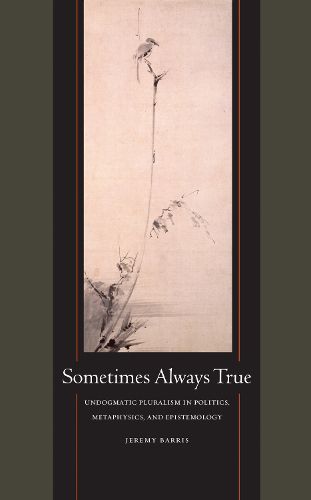Readings Newsletter
Become a Readings Member to make your shopping experience even easier.
Sign in or sign up for free!
You’re not far away from qualifying for FREE standard shipping within Australia
You’ve qualified for FREE standard shipping within Australia
The cart is loading…






Sometimes Always True aims to resolve three connected problems. First, we need an undogmatic pluralist standpoint in political theory, metaphysics, and epistemology. But genuine pluralism suffers from the contradiction that making room for fundamental differences in outlook means making room for outlooks that exclude pluralism.
Second, philosophy involves reflecting on the world and meaning as a whole, yet this means adopting a vantage point in some way outside of meaning.
Third, our lived experience of the sense of our lives similarly undermines its own sense, as it involves having a vantage point in some way wholly outside ourselves.
In detailed engagement with, among others, Davidson, Rorty, Heidegger, Foucault, Wilde, and gender and sexuality theory, the book argues that these contradictions are so thoroughgoing that, like the liar’s paradox, they cancel the bases of their own meaning. Consequently, it argues, they resolve themselves and do so in a way that produces a vantage point on these issues that is not dogmatically circular because it is, workably, both within and outside these issues’ sense. The solution to a genuinely undogmatic pluralism, then, is to enter into these contradictions and the process of their self-resolution.
$9.00 standard shipping within Australia
FREE standard shipping within Australia for orders over $100.00
Express & International shipping calculated at checkout
Sometimes Always True aims to resolve three connected problems. First, we need an undogmatic pluralist standpoint in political theory, metaphysics, and epistemology. But genuine pluralism suffers from the contradiction that making room for fundamental differences in outlook means making room for outlooks that exclude pluralism.
Second, philosophy involves reflecting on the world and meaning as a whole, yet this means adopting a vantage point in some way outside of meaning.
Third, our lived experience of the sense of our lives similarly undermines its own sense, as it involves having a vantage point in some way wholly outside ourselves.
In detailed engagement with, among others, Davidson, Rorty, Heidegger, Foucault, Wilde, and gender and sexuality theory, the book argues that these contradictions are so thoroughgoing that, like the liar’s paradox, they cancel the bases of their own meaning. Consequently, it argues, they resolve themselves and do so in a way that produces a vantage point on these issues that is not dogmatically circular because it is, workably, both within and outside these issues’ sense. The solution to a genuinely undogmatic pluralism, then, is to enter into these contradictions and the process of their self-resolution.